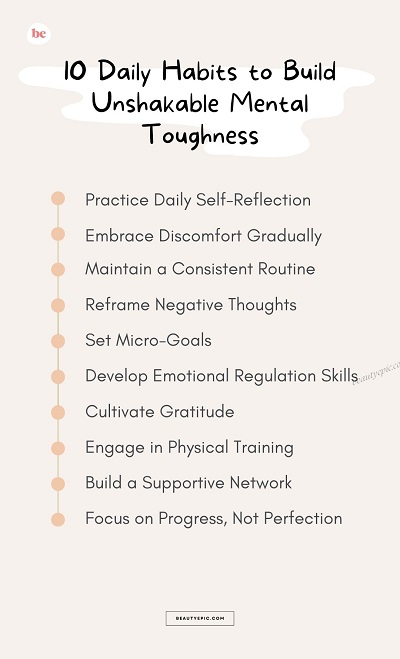
Important: This article is for informational purposes only. Please read our full disclaimer for more details.
Mental toughness isn’t about suppressing emotions or never feeling fear. It’s the ability to stay focused, adapt, and thrive under pressure. This skill can be cultivated through small daily habits that strengthen emotional and cognitive resilience over time.
Defining Mental Toughness: More Than Willpower
Mental toughness refers to the psychological strength to cope with stress, overcome obstacles, and maintain performance under challenging circumstances. According to American Psychological Association (APA) studies, mental toughness combines resilience, emotional regulation, and a growth mindset rather than sheer determination alone (1).
Why Building Mental Toughness Shapes Success
People with strong mental fortitude handle setbacks better, manage stress effectively, and maintain consistent progress toward goals. Research published in Frontiers in Psychology links mental toughness to better workplace performance, athletic achievement, and improved overall well-being. It’s not innate—it’s trainable (2).
10 Habits That Build Mental Toughness
1. Practice Daily Self-Reflection
- Why It Works: Self-reflection helps you understand emotional triggers and patterns in decision-making. This awareness forms the foundation of emotional regulation and resilience.
- Action Step: Spend 10 minutes journaling each night. Write down challenges you faced, your reactions, and how you could improve.
- Science Insight: A study in Personality and Social Psychology Review shows that self-reflection enhances adaptive coping and improves mental flexibility (3).
2. Embrace Discomfort Gradually
- Why It Works: Growth comes from controlled exposure to challenges, teaching the brain to tolerate stress.
- Action Step: Take on small discomforts daily—public speaking, learning a difficult skill, or waking up early.
- Science Insight: Research in Frontiers in Behavioral Neuroscience shows that graded exposure to stressors reduces fear responses and builds neural pathways for resilience (4).
3. Maintain a Consistent Routine
- Why It Works: Routines conserve mental energy and help manage unpredictability, making you more adaptable when challenges arise.
- Action Step: Create morning and evening rituals that anchor your day, such as meditation or reviewing goals.
- Science Insight: Studies from University College London show routines enhance self-discipline and reduce decision fatigue, both crucial for mental toughness (5).
4. Reframe Negative Thoughts
- Why It Works: Your internal dialogue shapes your stress response. Reframing teaches the brain to see challenges as opportunities.
- Action Step: When you catch a negative thought, rewrite it into a constructive one. Example: “I can’t handle this” → “I’m learning to handle hard things.”
- Science Insight: Cognitive Behavioral Therapy (CBT) research consistently proves that reframing thoughts builds resilience and reduces anxiety (6).
5. Set Micro-Goals
- Why It Works: Small, achievable goals create momentum and reinforce self-efficacy, which boosts mental strength.
- Action Step: Break big objectives into daily wins. Instead of “get fit,” aim to walk 20 minutes each day.
- Science Insight: Journal of Applied Psychology links micro-goals to increased motivation and long-term perseverance under stress (7).
6. Develop Emotional Regulation Skills
- Why It Works: Emotional control allows you to respond, not react, under pressure.
- Action Step: Use box breathing (inhale 4 sec, hold 4 sec, exhale 4 sec, hold 4 sec) during stressful moments.
- Science Insight: Research in Biological Psychology shows that breathing and mindfulness lower cortisol and improve emotional regulation pathways in the brain (8).
7. Cultivate Gratitude
- Why It Works: Gratitude shifts focus from problems to solutions, rewiring the brain for optimism and perseverance.
- Action Step: Write three things you’re grateful for daily, even during challenging times.
- Science Insight: NeuroImage studies show gratitude practice activates brain regions linked to emotional regulation and stress recovery (9).
8. Engage in Physical Training
- Why It Works: Exercise builds not only physical endurance but also mental discipline and tolerance to discomfort.
- Action Step: Incorporate both aerobic and strength training 3–4 times per week. Push through safe levels of discomfort to train perseverance.
- Science Insight: Harvard Health Publishing reports regular exercise reduces anxiety, boosts endorphins, and improves stress resilience (10).
9. Build a Supportive Network
- Why It Works: Strong relationships act as a buffer against stress and provide accountability when building mental habits.
- Action Step: Surround yourself with people who challenge and encourage you. Share goals with them for accountability.
- Science Insight: American Journal of Psychiatry highlights that social support significantly reduces the impact of chronic stress on mental health (11).
10. Focus on Progress, Not Perfection
- Why It Works: Perfectionism increases stress and fear of failure. Focusing on progress builds confidence and long-term resilience.
- Action Step: At the end of each week, review how far you’ve come rather than what’s left to achieve.
- Science Insight: Research in the Journal of Research in Personality shows that progress-focused thinking increases persistence and lowers burnout rates (12).
The Role of Exercise in Strengthening the Mind
Physical activity has a direct effect on mental toughness. Aerobic and resistance training release endorphins, regulate cortisol, and improve brain plasticity. Research in Harvard Health Publishing highlights that consistent exercise builds discipline, stress tolerance, and emotional regulation—key pillars of mental fortitude (10)(13).
Frequently Asked Questions (FAQ’S)
1. Can mental toughness be learned?
A. Yes. Studies show it’s not a fixed trait. Through consistent habits like self-reflection, mindfulness, and controlled exposure to stress, anyone can develop mental strength.
2. How long does it take to see results from these habits?
A. Mental toughness develops gradually. Many people notice improved resilience and stress response within 4–6 weeks of consistent practice.
3. Are mentally tough people emotionless?
A. Not at all. Mentally strong individuals feel emotions deeply but have the skills to regulate and use them productively instead of being controlled by them.
Building mental toughness is a lifelong process, but it starts with simple daily habits. By embracing discomfort, practicing gratitude, regulating emotions, and prioritizing physical and mental health, you create a foundation for lasting resilience. Over time, these small changes compound, shaping a mind capable of thriving under any circumstance.
















